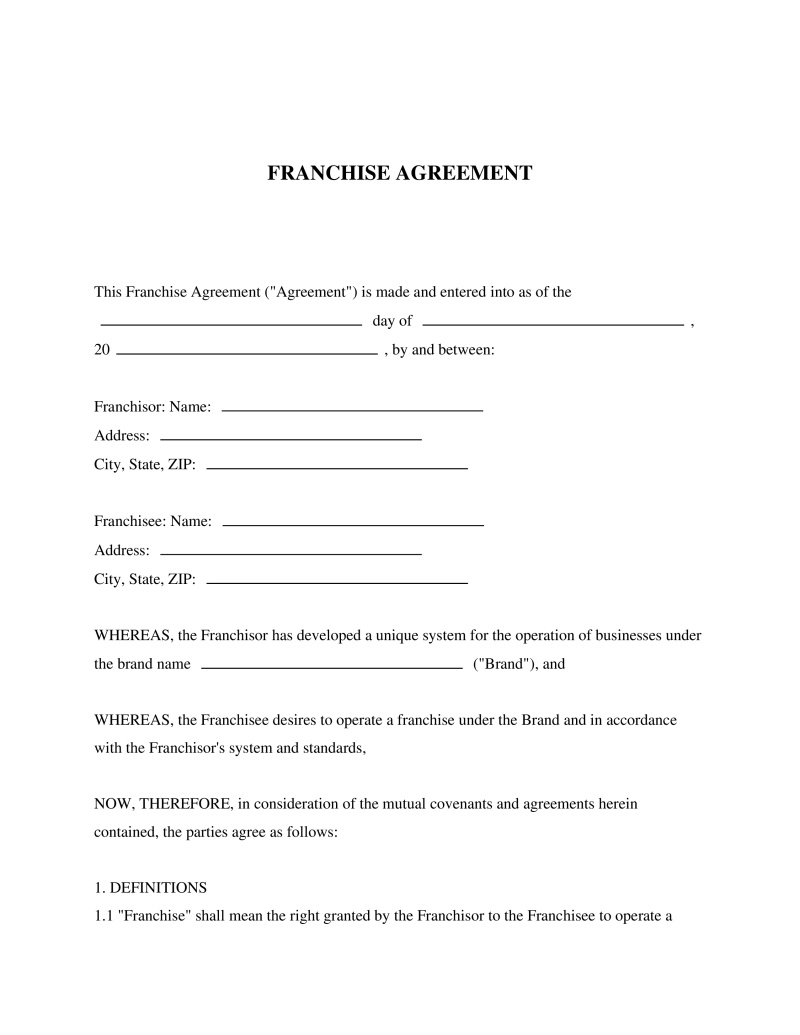A Franchise Agreement is a legal contract granting rights to operate a franchise, detailing terms, fees, and obligations for both parties.
Franchisor Name
Type the full legal name of the Franchisor as it appears in official documents. This is important because it identifies the business entity that owns the franchise rights. Make sure to spell it correctly and use the complete name, including any designations like "Inc." or "LLC," if applicable.

Table of Contents
What is a Franchise Agreement?
A Franchise Agreement is a legal contract that establishes the terms and conditions under which a franchisee is granted the right to operate a business under the franchisor's brand and system. This document delineates the rights and responsibilities of both parties, ensuring that the brand's standards are maintained across all locations while allowing individual franchise owners to benefit from the established brand's reputation, experience, and operational procedures. It is crucial for both existing business owners contemplating how to franchise their business and entrepreneurs wondering how to start a franchise. By clarifying expectations and obligations, this agreement helps in mitigating potential disputes, making it an essential tool for anyone looking to enter into a franchising relationship.
Key Features
Important Provisions
- Grant of Franchise: Specifies what is being licensed, including trademarks, operational systems, and proprietary information.
- Territorial Rights: Defines the territory in which the franchisee can operate and whether exclusivity exists within that territory.
- Financial Obligations: Details all fees payable by the franchisee, including initial fees, ongoing royalties, and any marketing fund contributions.
- Term and Termination: Establishes the duration of the agreement and conditions under which it may be terminated by either party.
Pros and Cons
Pros
- +Facilitates expansion of businesses by allowing them to license their brand and operational model to others.
- +Reduces risks associated with establishing new outlets by leveraging an existing brand's reputation.
- +Provides franchisors with a steady income through royalties while enabling franchisees to run their own businesses under a proven model.
- +Encourages uniformity in customer experience across different locations, strengthening brand identity.
- +Offers comprehensive support and training to franchisees, contributing to their success.
Cons
- -Limits the autonomy of franchisees in certain operational aspects due to brand standard requirements.
- -May involve significant upfront costs for franchisees due to initial fees and investment requirements.
- -Can lead to potential conflicts if either party fails to meet their obligations as stipulated in the agreement.
Common Uses
- For entrepreneurs seeking to open a new outlet under an established brand.
- By business owners interested in how to franchise their existing business model.
- In situations where an investor wishes to operate multiple locations of a well-known brand.
- When an international brand is expanding its operations into new markets through local partners.
- As part of a legal strategy to ensure compliance with local laws when operating a franchise.
Frequently Asked Questions
Do you have a question about a Franchise Agreement?
Example questions:
Not the form you're looking for?
Try our legal document generator to create a custom document
Community Discussion
Share your experience and help others
Legal Notice: Comments are personal opinions and do not constitute legal advice. Always consult a qualified attorney for matters specific to your situation.
Comments (0)
Leave a Comment
No comments yet. Be the first to comment!